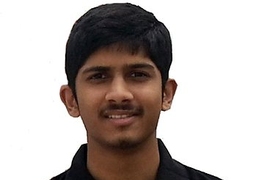Senior Amol Bhave never planned to apply to colleges in the U.S. Growing up in his hometown of Jabalpur, India, it just didn’t happen. That is, until he discovered the MIT OpenCourseWare (OCW) website and started watching lectures.
“Education in India is very focused on teaching and learning to do well on tests and get into college,” Bhave says. “I wanted more. I found the MIT OCW website and started watching lectures, and I loved the teaching style. Not focusing on how to get the maximum points on quizzes but focusing on enjoying and getting the most out of whatever you’re learning.”
After watching many OCW lectures and taking courses through MITx — including 6.002x (Circuits and Electronics), Bhave organized and started his own online course, named 6.003z (Signals and Systems), which more than a thousand students took part in.
Bhave was one of the early users of OCW and edX. The program — an online learning tool founded by MIT and Harvard University, recently celebrated its fifth anniversary. In the last five years, MITx has emerged as a leader in digital learning innovation — most recently launching the MITx MicroMasters, which enables learners around the world to take online courses toward admission into an MIT master’s program. Since MITx launched, more than 70 courses have been accessed by more than 2.5 million learners globally.
Following the success of 6.003z, Bhave reached out to MIT Professor Anant Agrawal, founder and CEO of edX, thanking him for 6.002x and sharing what that led him to create. Through his success and encouragement, Bhave decided he would try applying to MIT and see what happened. Bhave took the SATs, applied, and after spending many restless nights waiting for the results, received the news of his acceptance and started making plans to move to Massachusetts.
“I didn’t know what getting into MIT would mean to me back then or the full implications until now,” Bhave says. “It was just, ‘Wow, this is exciting. I want to see what happens.’ Now I feel like that single moment was life changing for me.”
Bhave arrived in the U.S. with his parents to attend orientation in August 2013 — the first time anyone in his family had left India — feeling both nervous and excited. “Leaving my country behind for four years, leaving my family and coming to a new country, and trying to live on my own was kind of scary. But it was also exciting. I was excited to start a new life and couldn’t wait to start to take courses.”
During the past four years, Bhave has made the MIT campus his home. In his dorm, Simmons Hall, he has bonded with his friends from all over the world. “The community I’ve found here, I don’t think I can find that anywhere else,” says Bhave. “The friends I’ve made are probably my most valued possessions I have right now.”
As graduation day approaches, Bhave is excited to see what life as a non-student will be like. An electrical engineering and computer science major, he accepted a position at Facebook, where he will be focused on software engineering in the company's infrastructure group, working on backend systems. “Graduation marks the end of a whole era. This is the point that marks the departure from being a student to the real world. I think that is what I’m most excited about, to see what that feels like — not having homework to do, not having PSETs to do, and just living in that kind of mindset.”
Bhave plans to be in the U.S. for the foreseeable future but says that down the road, he has a vision of starting schools back in India that can change the culture of education to focus on the love of learning, not just testing. “Without MIT’s online education initiatives,” he says, “I don’t think I would have ever been exposed to the education or any part of the world outside of India.”







